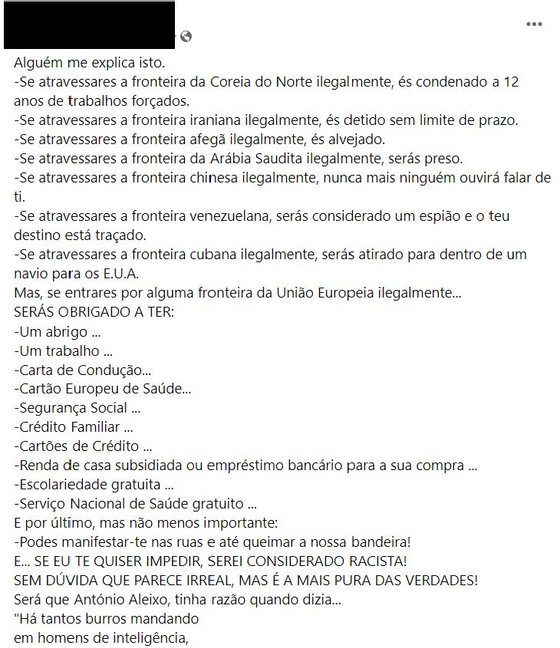Does someone who enters the European Union “illegally” have the right to a driving license, social security, credit cards or protected housing? What is the truth about the immigration policy of the 27?
“Someone explain this to me,” calls for a long post on Facebook that compares the immigration policy of various countries with the immigration policy that governs the European Union.
“If you cross the North Korean border illegally, you are sentenced to 12 years of hard labor. If you cross the Afghan border illegally, you are in the crosshairs”, but contrary to what happens in these countries “if you enter the European Union illegally they will demand a driver’s license, social security, work, credit cards, etc. sheltered housing”. rent”. The list is long but the author guarantees that “last, and not least: you can demonstrate in the streets and even burn the national flag.” The purpose of the post is clear.it tries to negatively compare European migration policies with the migration policies of some of the most restrictive countries in the world.
Post on Facebook with misinformation about European migration policy.
Let’s go in parts then. What is the European Union’s policy on illegal immigration? In 2022, 330,000 irregular migrants entered the borders of the EU member states. According to Frontex figures, it was the highest number since 2016 and represents an increase of 64% compared to the previous year, 2021.
These figures have led some member states such as the Netherlands, Belgium, Ireland and Denmark to express concern about the increase in irregular entries. At this meeting, which took place in 2023, the Prime Minister of Ireland made his position clear: “It is important that we, as Europeans, decide who enters our countries, not who engages in human trafficking. Those who obtain refugee status have the right to stay, but others do not, and must be ReturnedAnd the chancellor of Austria aligned herself in the same direction, defending what 27 needs”apply the brake” to illegal immigration in the European Union.
But there is news. Also on June 8, the majority of the ministers responsible for migration in the European Union reached an agreement to take another step towards the Migration and Asylum Pact that the 27 want to conclude by April 2024. now a certain number of applicants arrive in another country, subject to migratory pressures. If they refuse, they have to pay €20,000 for each rejected asylum seeker. Hungary and Poland voted against the agreement and Bulgaria, Malta, Slovakia and Lithuania abstained.
The European Union reaches an agreement on the reform of asylum rules
But the recent history of the European Union – from the 2015 refugee crisis — is not universally pro-immigration, particularly illegal immigration, as the post makes it seem. The publication reads: “If you enter through any border of the European Union illegallyyou will be obliged [um termo usado aqui com alguma carga de ironia] have a driver’s license, social security, work, credit cards, protected housing rent”.
In November 2020, the European Commission presented the Action Plan on Integration and Inclusion for 2021-2027, a plan that “promotes inclusion for everyone” and “remove the barriers that may impede the inclusion of people of migrant origin”. The Action Plan urges Member States to: commit to “inclusive education and training” for migrants; promote the improvement of “employment opportunities”; provides specific funding to promote “access to health services” and access to “adequate and affordable housing”. But this action plan aims to integrate citizens “nationals of foreign countries who reside legally in the EU”.
Instead, the policy of the European Union towards illegal immigrants is based on the “return” to their countries of origin. The European Commission itself defines that “the return of migrants in an irregular situation is essential to increase the credibility of policies in the field of international protection and illegal immigration.” “Every year, more than 300 thousand foreigners they are forced leave the european unionbecause they entered or remained irregularly”.
???? Stop by default ‼️
new report of @Oxfam and @GCRefugees looks at how Greece, with the support of Europe, is increasingly turning to the practice of administrative detention to manage migrants in Greece.
???? https://t.co/rAXafMbTKT#EUMigration pic.twitter.com/obgtAXUY5k
— Oxfam EU (@OxfamEU) November 16, 2021
This part of the European migration policy raises voices of alarm among humanitarian organizations. Oxfam, for example, denounces that migrants and refugees are mistreated by police in countries like Serbia, Croatia, Hungary and Bulgaria: “The violence and the harassment are used to unlawfully remove them and deny them access to asylum procedures.” In another example, the association Doctors Without Borders accuses the member states of the European Union of approving “violent policies that cost lives” and argues that the effort made to welcome Ukrainian refugees demonstrates that the EU is “capable of creating and implementing a humanitarian migration policy”. : the only one that the lack is political will“.
to the observer, André Costa Jorge, from the Refugee Support Platform, recalls that “since the early 2000s” the European Union has adopted a “firm stance to combat irregular immigration”, as reported by the European Parliament . As a general rule, national laws not grant supportor ways of regularization for people who entered the EU illegally“. In the Portuguese case, it is possible for a migrant to regularize his situation “through work”, even if he enters illegally.
“They must work and pay taxes (IRS) and contributions (Social Security) for 12 months and, during that period, they do not have access to basic rights, such as free access to the SNS, Portuguese classes, professional training, nor can they freely resort to the authorities in the case of labor exploitation or the commission of serious or very serious crimes, since they run the risk of being arrested Is deportee.” Even so, and with the magnifying glass still focused on the Portuguese case, immigrants who are in an irregular situation continue to have access to health, “but they pay the real value of the consultations and exams, which means that a Going to the emergency room can cost more than 100 euros.”
Even for immigrants who see their situation regularized in Portugal, it is “completely false that they are required to have a driving license”, “completely false” that they are obliged to open a bank account or that the majority of the immigrant population complies with the requirements. Requirements for the assignment of the credit card.
It is also equally false that immigrants have subsidized income. As the president of the Refugee Support Platform explains, “as a general rule, immigrants and refugees are left out of public housing policies in Portugal”, since the national support programs require an effort rate test “very inferior to the reality of the migrant” and a minimum of five years of residence in the Municipality.
Conclusion
Does the European Union respect the human rights of its immigrants more than countries like North Korea or Afghanistan? Yes. No doubt. But this is not the point that the post tries to prove. Suggests that immigrants cross European borders illegally they have advantages waiting for them, such as “driver’s license, work, credit cards, subsidized housing rent”. That is not true. Even the list of incentives suggested by Brussels to member states is aimed at citizens “nationals of foreign countries who legally reside in the EU“.
In addition, Europe suffered one of the worst refugee crises on the continent in 2015 and the way in which it responds to the arrival of irregular or illegal immigrants has, since then, been very criticized by various humanitarian organizationssuch as Doctors Without Borders or Oxfam.
As a general rule, national laws not grant supportor pathways to regularization for people who entered the EU illegally“, reinforces the Refugee Support Platform. The Platform talks about a publication that aims to “foment hate and violence based on information.”
MISTAKEN
In the Facebook rating system this content is:
FAKE: Main content claims are factually inaccurate. This option generally corresponds to “fake” or “mostly fake” ratings on fact check sites.
NOTE: This content was curated by The Observer as part of a fact-checking partnership with Facebook.

Source: Observadora
